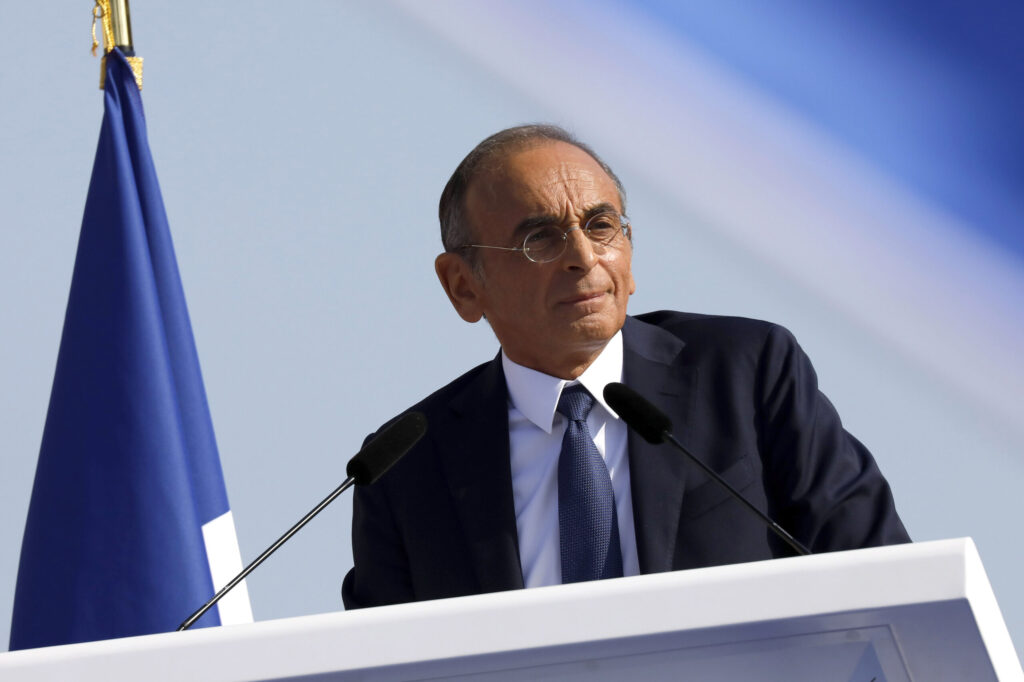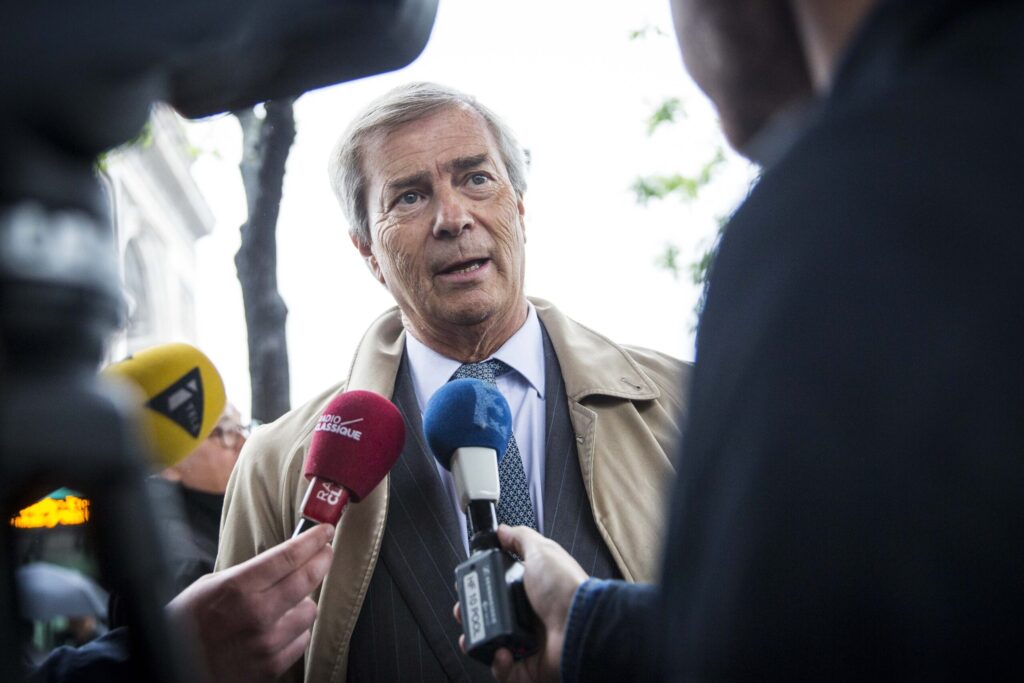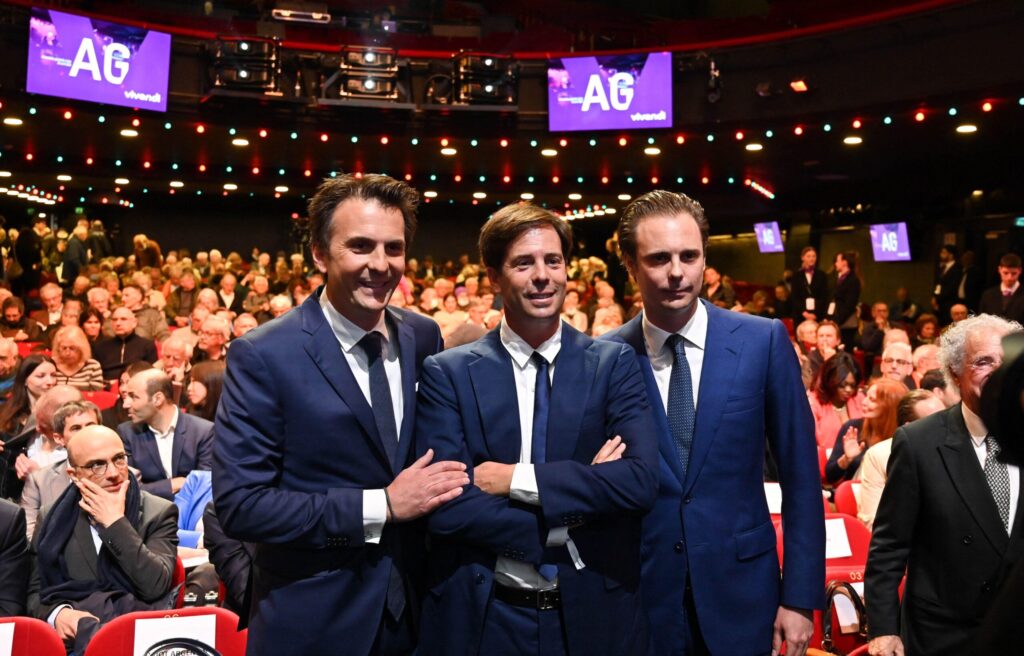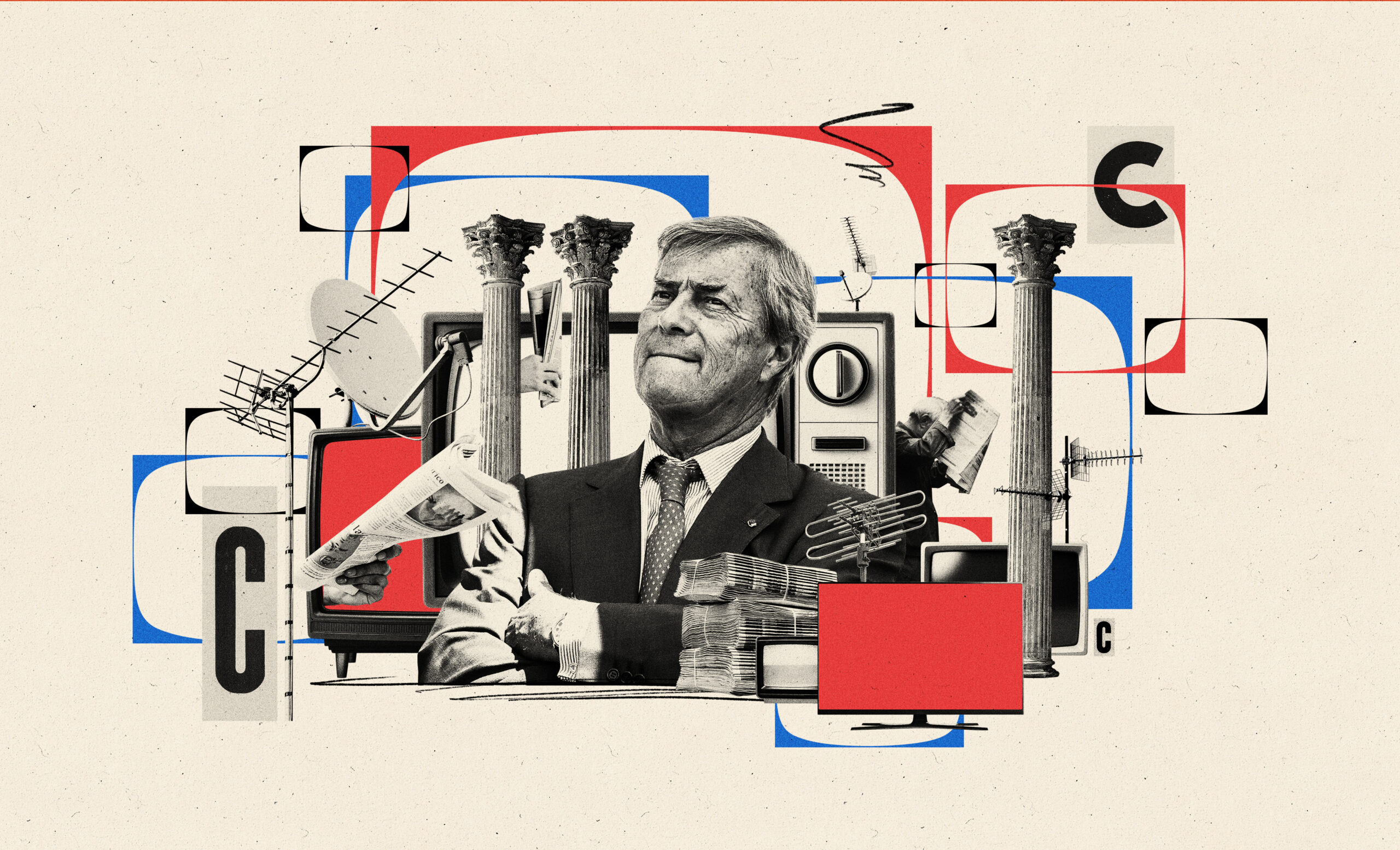On Feb. 17, 2022, French billionaire Vincent Bolloré officially retired as chairman of his family’s business after more than 40 years leading the company. The event took place in the family stronghold, in a small village on the Western coast of France, and marked the ceremonial handover of power from Vincent to two of his sons, Yannick and Cyrille. To the sound of bagpipes, they attended a mass celebrating the 200th anniversary of the family business, dressed in traditional Breton costumes for the occasion. As they left the chapel, a handful of demonstrators brandishing "Stop Bolloré" placards reminded participants of the controversy surrounding the group's activities.
It was here in Brittany that the Bolloré empire was born. What began as a paper company in 1822 eventually grew into a sprawling conglomerate that has included forays into the banking, energy, and logistics sectors. Much of the scrutiny, however, has centered around the Bolloré Group’s acquisition and handling of media outlets like CNews, a television channel where on-air personalities routinely make derogatory statements about migrants and have called on Muslims to renounce their faith. The station has also been intensely criticized for what media advocates and scholars say is its role in mainstreaming far-right ideas about immigrants overtaking the French population.
Vincent Bolloré, who took over the company in 1981, pieced together a tangled mix of media properties often using the same acquisition strategy. His modus operandi, now taught in business schools across France, consists of taking very small stakes in companies and increasing them until a stock market raid is triggered, enabling him to be the largest shareholder. It’s a method that is both effective and controversial. This is how he came to control the TV station Canal+, magazine company Prisma Media, the radio station Europe 1, the print weekly Paris Match, and Le Journal du Dimanche, the only standalone Sunday newspaper in France. Under Bolloré’s control, each of these outlets has been subjected to the same methods of cost-cutting, programming changes, layoffs, and editorial pivots.
But nowhere has the model been more utilized than at CNews, which occupies a unique place in the French media landscape. The station launched in February 2017 and is broadcast free into all households. In the years since, it has gradually imposed itself as a low-budget French version of Fox News, beaming inflammatory talking points into the homes of around eight million viewers each day, according to Mediametrie, a company that compiles television ratings. The news channel, where personalities come to comment on current events in studios without an audience, has an aging viewership — mostly people over 60, living in the provinces. On channel 16, all day long, hosts hold debates and argue as if at the local bistro, willingly letting themselves go into what the French call “dérapages” — outrageous remarks — but which have ended up becoming the editorial line.
The station has also given voice to the far-right National Rally leaders like Marine Le Pen, Jordan Bardella, and Sébastien Chenu. (Le Pen and Chenu are now seated in France’s lower parliament, the Assemblée Nationale, thanks to a wave of support for Le Pen during the 2022 elections.) The stunning result came on the heels of CNews pundit Éric Zemmour’s failed presidential candidacy during which he called for “zero immigration,” banning headscarves and yarmulkes from public spaces, and building a wall to keep out immigrants. Though he failed to make it past the first round of voting, Zemmour’s candidacy marked a turning point in the political landscape. When trying to understand how public opinion has veered so far to the right, many experts point to the Bolloré family and their most provocative asset, CNews.

French economist Julia Cagé, who studies democracy, media pluralism, and campaign finance, compares Bolloré to the Koch brothers, who used their wealth to create a system of think tanks and advocacy groups designed to peddle influence. “His influence goes far beyond the media,” she says. “It extends to the publishing sector, to the financing of university chairs. It's a strategy that amounts to influencing all forms of thought production.”
The Bolloré Group has become a matter of democratic concern. In 2021, the non-governmental organization Reporters Without Borders published a short documentary on Bolloré’s different media outlets, denouncing “these repeated attacks on press freedom and the independence of editorial offices [which] constitute an unprecedented threat to democracy.” In February 2022, a collective called “Stop Bolloré,” composed of unions, associations, journalists, and left-wing pundits, denounced the billionaire’s construction of a "tentacular media empire" which serves a "reactionary ideology." "The editorial line [of CNews] shows an obsession with far-right themes,” they wrote. “Breaking with all journalistic ethics, it is no longer a matter of informing citizens, but of transforming minds."
“[Bolloré’s] influence goes far beyond the media. It extends to the publishing sector, to the financing of university chairs. It’s a strategy that amounts to influencing all forms of thought production.”
—Julia Cagé, French economist
That day in 2022 in Brittany, as the company was being handed over to the 7th generation of Bollorés, the media empire was stronger than ever with an influence that resonates across France. And even though the company’s leadership technically changed hands, the man that turned it into a behemoth wasn’t completely stepping aside. “I am handing it over," Vincent Bolloré said. “But I do not intend to disappear.”
Born in 1952, Bolloré spent his formative years between the family mansion in the Bois de Boulogne on the western edge of Paris, the Breton village of Ergué-Gabéric, and Saint-Tropez (where the Bolloré family keeps its yacht.) His father, Michel, was a fixture of Parisian high society and a close friend to President Georges Pompidou. But Michel Bolloré nearly bankrupted the family business. It was his youngest child, Vincent, who took the helm, diversifying its activities into energy, agriculture, transport, logistics, maritime freight, and advertising. Under Vincent’s leadership, the Bolloré group expanded into more than 100 countries. His logistic business in Africa, which has represented up to 80% of the company’s profits and portion of which has been sold, had come under legal scrutiny. In 2018, Vincent Bolloré was placed under investigation by the Central Office Against Corruption and Financial and Tax Offences. “In February 2021, Mr. Bolloré admitted to his responsibility on charges of active corruption of foreign public officials and complicity in breach of trust in Africa,” Le Monde reported. “The Bolloré group was suspected of having paid for services provided by Havas, a Vivendi subsidiary, during the election campaigns of the Togolese and Guinean presidents, in exchange for favors relating to the ports of Lomé and Conakry.”
It was in order to involve his son Yannick, a night owl with little interest in the group's industrial activities, that Bolloré claims to have invested in the media. Thus, in 2005, he launched the Direct 8 television channel, an almost surreally amateurish and fully live station that airs political and entertainment programming, and Direct Matin, a free daily paper, in 2007. About five years later, he sold them both to the Canal+ Group, then owned by Vivendi. He negotiated a share exchange, which allowed him to gain a foothold in Vivendi. Initially a small shareholder, Bolloré quickly amassed a larger ownership stake through share buybacks, until he became the largest shareholder of Vivendi in 2012, which gave him some measure of control of the media properties he sold to Canal+ a few months earlier.
CNews was built on the ruins of its predecessor, i-Télé, a news network owned by the Canal+ group, which folded after a historic editorial strike in October 2016. That protest was one of the longest in the history of private broadcasting and led to the departure of some 100 journalists, freelancers included, according to the unions involved. The strike had been a reaction to the hiring of the TV host Jean-Marc Morandini — Bolloré’s friend — even though he was under investigation for the "aggravated corruption of minors" and "sexual harassment and undeclared work." (One of the complainants alleged that Morandini had asked him to masturbate in front of him as part of an audition.) Morandini received a one-year suspended sentence in the first case and a six-month suspended sentence in the second, though he has appealed both.
i-Télé positioned itself as something like a low-budget CNN, with reporters in the field and a focus on hard news, economics, international affairs, and politics. But the channel hemorrhaged money, and the debate format, which is much less expensive, gradually took over the programming schedule. In May 2016, Bolloré installed Serge Nedjar, a loyal former head of Direct Matin, as the station’s general manager and editorial director, a move that signaled a departure from traditional editorial standards of objectivity. (Direct Matin, which was renamed CNews a few years later, for example, has been accused on numerous occasions of serving the interests of Vincent Bolloré, by promoting Autolib, the company's electric car sharing service, and sporting events broadcast by Canal+.)
Once CNews was launched in February of 2017, the newsgathering operation was effectively overpowered, and opinion programming dominated the station. “We no longer watch a news channel to know what's going on! We have all the news on our smartphone,” Nedjar told Le Parisien in June 2020. What mattered now was debate, he said, adding “We don't restrict ourselves to any theme or speaker on the subjects that concern people.”
If the channel does not explicitly claim a political affiliation, the "freedom of expression" attitude CNews clings to has a well-defined slant. On the channel's flagship program, “L'Heure des Pros,” guests shout at each other without much concern for the facts. Immigration is a consistent theme as are perceived security threats, the hijab, the headscarf worn by Muslim women, and, increasingly, the American cultural import dubbed “le wokisme.” It is possible at CNews to wax sarcastic about global warming when the temperature drops below freezing. A journalist can relay, without being contradicted, the false statistic that “50% of young Muslims in the suburbs claim to support the Islamic State” or describe the new icon of the environmental left as “a menopausal Greta Thunberg.” A video of Didier Raoult — a medical doctor and champion of the anti-vaccine movement — comparing the treatment of those who don’t vaccinate to that of the Jews during World War II was aired on the channel to little contradiction.
Then, on Oct. 31, 2021, a line was crossed when Renaud Camus, the explicitly xenophobic writer whose catchphrase the “Great Replacement” — which posits the “native” French population will be supplanted by immigrant populations — was invited over the protests of the editorial staff. Traditional media have witnessed the rise of this station with a mix of bewilderment and contempt. Le Monde published a piece “A week watching only CNews,” as if it were a journey in a foreign country, and Télérama has a humor column that regularly targets the egregiousness of the guests.
The radicalization of news channels is, of course, an international phenomenon. But CNews has attracted international attention for being more than just another right-wing network. More than merely supporting a candidate, it produced its own — Zemmour, who ran for president in 2022 drawing comparisons to former President Donald Trump. “Trump went from reality TV to the White House. But he was the candidate of the Republican Party, while Zemmour is the candidate of an audiovisual group,” former President François Hollande said in an interview with Corriere della Sera in October 2021. “We reproached Silvio Berlusconi for putting his TVs at the service of his political career, but now there is a private group, Bolloré’s, which has chosen Zemmour as the spokesman of its interests.”
Zemmour, a prominent journalist who spent most of his career at the right-wing daily Le Figaro, was already a familiar presence on both TV and radio, regularly playing the specifically French role of the literary reactionary. He joined the staff of CNews as a special contributor in October 2019. Every day, on "Face à l'info," Zemmour would read an op-ed, then debate the day’s current events with an opponent, under the benevolent arbitration of a supposedly “unbiased” host. In this role, Zemmour has defended the bloody conquest of Algeria and the French general who led the slaughter. He has castigated unaccompanied minors: "They are thieves, they are murderers, they are rapists, that's all they are. They must be sent back," he declared, with little on-air pushback. During one debate, against the philosopher Bernard-Henri Lévy, he defended one of his pet causes: the idea that Maréchal Pétain had actually saved French Jews during the Second World War — comments that led him to be prosecuted for “contestation of a crime against humanity.” (Pétain collaborated with the Nazis to deport French Jews. Zemmour was acquitted, but the Court of Cassation, the highest court in France, ruled in September that he be retried.) The audience tripled within a few weeks, and by 2021 reached as many as 900,000 viewers at a time — a huge success for CNews, which became the second most watched news channel behind BFM-TV, the leading all-news channel created in 2005.
Representatives for CNews, Bolloré, and the Bolloré Group declined repeated requests for comment. However, in July 2022 Nedjar defended the organization, arguing in Le Parisien that, “the extreme right has not progressed because of our channel. … We achieve 2.1% of the audience when France 2 and TF 1 do between 14% and 20%. We’re given power we don’t deserve.” Yet these numbers do not capture the extent of CNews’s influence. In testimony before a Senate commission on media concentration in January 2022, Bollore similarly downplayed his conglomerate’s reach, saying it’s “a dwarf” compared to companies like Apple, Sony, and Disney.

Zemmour’s words, however, reverberated across the French media ecosystem. “No one [had] dared to speak of foreigners in these terms anymore,” says Alexis Lévrier, a professor of the history of journalism at University of Reims. Zemmour brought us “back to the words used in the extreme right-wing press between the two wars.”
Author Daniel Schneiderman in his book “The War Before the War,” which was published in 2022, drew a comparison between the radicalization of CNews and the anti-Semitic nationalist press that developed by ultra-politicized journalists — like Charles Maurras, a virulent anti-Semite — in the 1930s. The rhetoric remains useful for the far-right trying to motivate its electoral base, though the target has changed: It’s now French Muslims — an estimated 10% of the population. In clear echoes of the anti-Jewish journalists of the past, Zemmour has repeatedly demanded that Muslims renounce their faith in order to “assimilate” into the mainstream.
“No one [had] dared to speak of foreigners in these terms anymore. [Zemmour brought us] back to the words used in the extreme right-wing press between the two wars.”
—Alexis Lévrier, professor of journalism history at the University of Reims
“The strength of CNews comes from the fact that, unlike Fox News, they present themselves as weak, the voice of the underdogs,” says media historian Alexis Lévrier. “It's an inversion of reality: CNews' audience is certainly [relatively small], but they have rubbed off on the rest of the media.” France Inter, the main national public radio station has long been called in far-right circles "Radio bolcho," for Bolshevik, because of their perceived left-leaning editorial line. Yet in 2021, they hired Alexandre Devecchio, a writer at Figaro Vox and editorialist at CNews, as a token of pluralism, giving him a much wider audience. Meanwhile, France 5, the main public television station, caused a stir when it tasked in February 2022 the Canadian polemist Mathieu Bock-Côté, a proponent of “anti-wokism” and substitute for Zemmour on CNews, with directing a documentary on the presidential campaign. (CNews forbade Bock-Côté from taking on the assignment.) In recent years, French political journalists have regularly asked candidates about the “great replacement,” an idea Zemmour has promoted many times on CNews, allowing it to make its way from the depths of the ultra-right ideology to mainstream media.
In many ways, Zemmour has moved the country’s Overton window. Le Pen’s unprecedented victory in Parliament has meant not only a considerable fundraising boost for her party, but also more media exposure given the rules that require television and radio to give airtime proportionally to electoral weight. A recent study showed that by 2019-20 the air timeshare devoted on CNews to radical-right guests has increased by nearly 15 percentage points over the previous six years. In one week in August 2020, for example, former National Rally executive Jean Messiha, an advisor to Marine Le Pen at the time, enjoyed more than nine hours of airtime on the channel in five days. CNews has also been criticized by Arcom, the French media regulator, for not respecting political pluralism and the rule that the different "currents of thought and opinion" must have fair access to the airwaves. CNews was put on notice for having reserved "massively unfavorable programming conditions" for representatives of the government or the extreme left-wing party LFI, relegating their appearances to late night and at times of very low audience.
These ideological inflections can be seen in other outlets controlled by the Bolloré Group. On June 23, Geoffroy Lejeune was appointed as the top editor in chief of the Sunday newspaper, le Journal du Dimanche. Lejeune, is a friend and vocal supporter of Zemmour and had just been fired from Valeurs Actuelles, a far-right weekly magazine, for being too radical. The news of his arrival at the helm of a centrist newspaper that has become an institution, sparked an outcry from all across the political spectrum. Since then, the outlet has hired three journalists from RT France, a propaganda channel financed by the Russian state and suspended in France since the invasion of Ukraine.
In January 2022, Vincent Bolloré was interrogated by the French Senate’s commission on media concentration. He was not the only target of inquiry. The commission interviewed all the other French media tycoons including Patrick Drahi, founder of cable operator Numericable (which became Altice), and Xavier Niel, who owns a stake in Le Monde. But Bolloré’s hearing was among the most anticipated. Defining himself as a “Christian Democrat,” he denied pursuing an ideological project. Media, he argued, is a very lucrative business. Yet, he defended the “treasure” his empire is built upon — French history and culture: “When we do Versailles, when we do Clovis, it's more interesting than when we do Superman 1, 2, 3, 4, 5, 6, 7, etc."
A confidential internal audit, however, revealed the financial difficulties facing Vivendi’s channels. CNews was supposed to break even for the first time in 2022 but instead ran a deficit of 4 million Euros, according to La Lettre, an investigative news outlet that looks at the workings of France's political, economic, and media powers. CNews' weight in public debate has not been converted into profits, the news outlet concluded. “It would appear that, for Vincent Bolloré, the interest in controlling this channel lies not in its profitability, but solely in its influence on public debate.”
In April 2022, Bolloré Africa Logistics was sold to MSC Group for 5.7 billion euros, giving the company a considerable influx of cash. But that didn’t mark the end of the company’s influence across the continent. "The Bollore Group will remain strongly involved in Africa, notably through Canal+, and will also continue to develop on this continent its activities in many fields such as communications, entertainment, telecommunications and publishing," the company said in a statement.
Four days after the family ceremony in Brittany, Vivendi officially launched a public buyout of Lagardère — which owns Hachette Livre — the world's third-largest publishing group. Bolloré had previously bought Editis, France's second-largest publishing group, and was planning to merge the two companies into a gigantic conglomerate. On Friday June 9, the European Commission's antitrust authorities gave the green light to public buyout on the condition that the group must divest Editis. On July 25, the European Commission announced an investigation into whether Vincent Bolloré's group had committed an "anticipated takeover." It could impose a fine of up to 10% of its revenues. That case is still pending.
Since Yannick took over, not much has changed at CNews. The programming is still feeding off of and creating divisions within France. The station’s coverage of the Oct. 7 attack on Israel and Israel’s bombardment of Gaza has prompted anti-Muslim commentary. After the attack, the host of “L’heure des Pros,” Pascal Praud, framed the war as a "conflict of civilization," asserting that, "Israel is at the tip of the West, and what is played out there may one day be played out in Paris." A few days later, Éric Zemmour was invited to comment, affirming his support for Israel's self-defense, and stating "the West is in mortal danger because of the growing Islamization of all our countries.” Another guest suggested that “many Muslims work on building sites and have access to explosives; if there were an order to kill Jews, there could be an attack every day.”

And in recent weeks, a CNews host asked a guest whether the infestation of bed bugs in Paris could be linked to refugees and a columnist called for the "recolonization, if only economically" of Africa.
Vincent’s mark is still being left on the company. It was with Vincent himself that Czech billionaire Daniel Kretinsky directly negotiated the purchase of Editis from Vivendi. The sale, announced in June, is a key step to satisfy regulators that would otherwise block the company from acquiring Lagardère. Vincent is also supervising takeover proposals for Telecom Italia, of which Vivendi is the main shareholder.
Despite stepping down, Vincent Bolloré isn’t stepping away.




